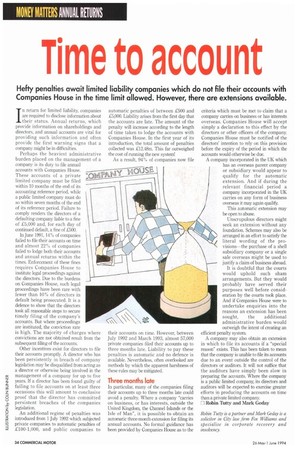Time to account
Page 36

If you've noticed an error in this article please click here to report it so we can fix it.
Hefty penalties await limited liability companies which do not file their accounts with Companies House in the time limit allowed. However, there are extensions available.
III return for limited liability, companies are required to disclose information about their status. Annual returns, which provide information on shareholdings and directors, and annual accounts are vital for providing such information and often provide the first warning signs that a company might be in difficulties.
Perhaps the heaviest administrative burden placed on the management of a company is its duty to file annual accounts with Companies House. These accounts of a private limited company must be filed within 10 months of the end of its accounting reference period, while a public limited company must do so within seven months of the end of its reference period. Failure to comply renders the directors of a defaulting company liable to a fine of £5,000 and, for each day of continued default, a fine of £500.
In June 1991, 14% of companies failed to file their accounts on time and almost 22% of companies failed to lodge both their accounts and annual returns within the times. Enforcement of these fines requires Companies House to institute legal proceedings against the directors. Due to the burdens on Companies House, such legal proceedings have been rare with fewer than 10% of directors in default being prosecuted. It is a defence to show that the directors took all reasonable steps to secure timely filing of the company's accounts, But where proceedings are instituted, the conviction rate is high. The majority of charges where convictions are not obtained result from the subsequent filing of the accounts.
Other incentives exist for directors to file their accounts promptly. A director who has been persistently in breach of company legislation may be disqualified from acting as a director or otherwise being involved in the management of a company for up to five years. If a director has been found guilty of failing to file accounts on at least three occasions this will amount to conclusive proof that the director has committed persistent breaches of the companies legislation.
An additional regime of penalties was introduced from 1 July 1992 which subjected private companies to automatic penalties of £100-1,000, and public companies to automatic penalties of between £500 and £5,000. Liability arises from the first day that the accounts are late. The amount of the penalty will increase according to the length of time taken to lodge the accounts with Companies House. In the first year of its introduction, the total amount of penalties collected was £12.48m. This far outweighed the cost of running the new system!
As a result, 94% of companies now file their accounts on time. However, between July 1992 and March 1993, almost 57,000 private companies filed their accounts up to three months late. Liability to pay these penalties is automatic and no defence is available. Nevertheless, often overlooked are methods by which the apparent harshness of these rules may be mitigated.
Three months late
In particular, many of the companies filing their accounts up to three months late could avoid a penalty. Where a company "carries on business, or has interests, outside the United Kingdom, the Channel Islands or the Isle of Man", it is possible to obtain an automatic three.month extension for filing its annual accounts. No formal guidance has been provided by Companies House as to the criteria which must be met to claim that a company carries on business or has interests overseas, Companies House will accept simply a declaration to this effect by the directors or other officers of the company. Companies House must be notified of the directors' intention to rely on this provision before the expiry of the period in which the accounts would otherwise be due.
A company incorporated in the UK which has an overseas parent company or subsidiary would appear to qualify for the automatic extension. And if during the relevant financial period a company incorporated in the UK carries on any form of business overseas it may again qualify This automatic extension may be open to abuse.
Unscrupulous directors might seek an extension without any foundation. Schemes may also be arranged in an effort to satisfy the literal wording of the provisions—the purchase of a shell subsidiary company or a single sale overseas might be used to justify a claim of business abroad.
It is doubtful that the courts would uphold such sham arrangements. But they would probably have served their purposes well before consideration by the courts took place. And if Companies House were to undertake enquiries into the reasons an extension has been sought, the additional administrative burden would outweigh the intent of creating an efficient penalty system.
A company may also obtain an extension in which to file its accounts if a "special reason" exists. This has been taken to mean that the company is unable to file its accounts due to an event outside the control of the directors or auditors. It will not suffice that the auditors have simply been slow in preparing the accounts. Where the company is a public limited company, its directors and auditors will be expected to exercise greater efforts in producing the accounts on time than a private limited company.
7 Robin Tutty and Mark Geday
























































































